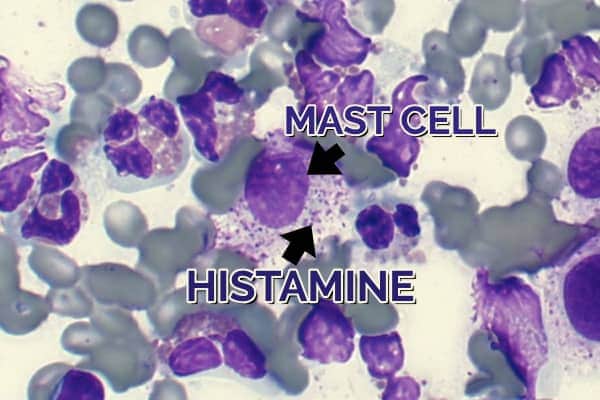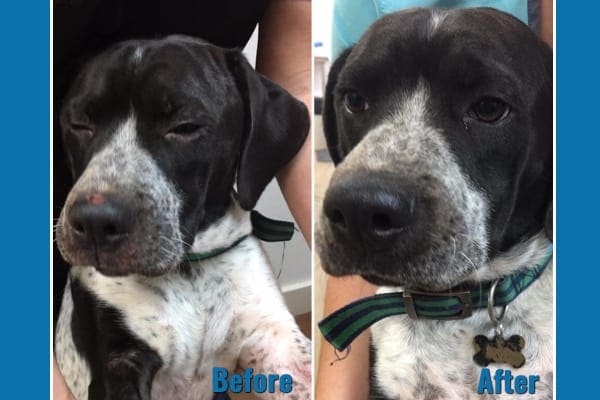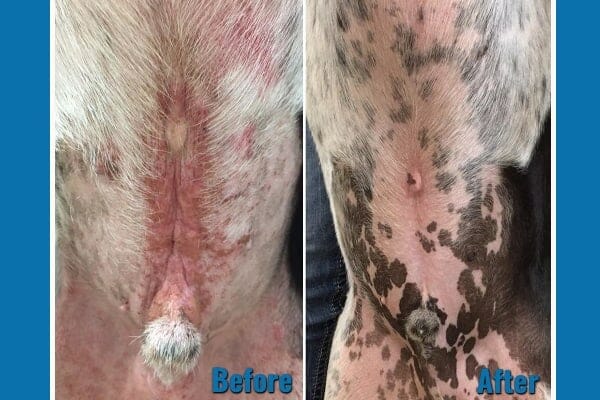Are you searching for everything you need to know about allergy medicine for dogs? Help is here. Integrative veterinarian Dr. Julie Buzby guides you through the signs, symptoms, and treatment options for canine allergies, including the latest on newer allergy medications such as Apoquel® and Cytopoint®.

Allergies are a very common problem in dogs. But that doesn’t make it any easier for you or your beloved canine companion who is suffering.
Thankfully, now veterinary medicine has more to offer our itchy canine companions than Benadryl® and prednisone, the “go-to” allergy medicines for dogs in prior decades. There are newer veterinary-prescribed medications like Apoquel and Cytopoint that can quickly quell the itch.
By the end of this article, you’ll have a comprehensive list of 10 solutions for dogs with allergies that includes Benadryl, Apoquel, and Cytopoint. Read on or jump to a specific topic by clicking any of the headlines in the Table of Contents below.
- What are dogs allergic to?
- What are the symptoms of skin allergies in dogs?
- How will the vet diagnose a dog with allergies?
- Treating allergy flare-ups in a senior dog
- What causes allergies in dogs?
- Benadryl, Apoquel, and 8 more options for treating allergies in dogs
- Partner with your veterinarian to help you find the best allergy medicine for your dog
- Infographic: Allergy medicine for dogs
- What questions do you have about allergy medicine for dogs?
What are dogs allergic to?
Before we can talk about some strategies to manage allergies in dogs, first we need to establish the types of allergies dogs suffer from. Dog allergies fall into three main categories:
- Environmental allergies
- Food allergies
- Flea allergies

1. Environmental allergies in dogs
Environmental allergies, also known as seasonal allergies, atopy, or atopic dermatitis, are exactly what the name would indicate—allergies to components of your dog’s environment. The most common environmental allergens include:
- tree pollen
- weed pollen
- grass pollen
- dust mites
- mold and mildew
While these are the most common, dogs also can be allergic to other environmental substances. The dog may show allergy symptoms part of the year when certain pollen counts are high. Or, if the dog has allergies to multiple pollens or to indoor allergens, he or she may be symptomatic year-round.
2. Food allergies in dogs
Food allergies, also known as cutaneous adverse food reactions (CAFR), occur when your dog’s immune system sees foods or ingredients as an allergen. There are a variety of foods that have been implicated in food allergies in dogs. The most common culprits are beef, chicken, lamb, and wheat.
Dogs typically develop allergies to foods they have been eating for a while (months to years). It is much less common for them to start to show food allergy signs around the time they start eating a new food.
3. Flea allergies in dogs
Dogs with flea allergies (flea allergy dermatitis or FAD) are not allergic to the presence of the fleas themselves. Rather, they are allergic to the flea’s saliva that is deposited in the skin when it bites the dog. This means it only takes a few flea bites to make a flea-allergic dog significantly itchy.
Having allergies may require a combination of treatments
To further complicate matters, a dog may suffer from one, two, or all three of these types of allergies. The symptoms of these allergies have a cumulative effect. This is why your veterinarian may treat your dog with a combination of allergy medications for dogs, food changes, and other strategies, especially if your dog has more than one type of allergy. Sadly, there is no single “magic bullet” that works in all cases all the time.

What are the symptoms of skin allergies in dogs?
Dogs with food, flea, or environmental allergies (or a combination of these allergies) tend to have similar signs. Some of the common symptoms of allergies in dogs include:
- Itchy ears that are prone to infections
- Licking or gnawing at feet and legs due to itchy dog paws
- Incessant scratching of the armpits, belly, face, base of the tail, or seemingly everywhere
- Red, irritated skin that is prone to yeast or bacterial infections (pyoderma in dogs)
- Frequently attempting to rub the face or body against the floor
- Dog losing hair
- Additional skin problems such as hot spots in dogs, interdigital cysts in dogs, or furunculosis in dogs
- Less commonly, a dry cough or other respiratory symptoms
- Vomiting or diarrhea (occasionally seen with food allergies)
Allergies can impact your dog’s quality of life
Dogs who suffer from moderate to severe allergies often scratch constantly, lick their paws obsessively, and battle one ear infection or skin infection after another. In short, quality of life ebbs for these itchy dogs. They are too busy scratching and licking to fully enjoy the simple pleasures of dogdom.
Thus, if your dog is showing some of these symptoms, please make an appointment with your vet.
How will the vet diagnose a dog with allergies?
During the appointment, your vet will ask you a lot of questions about your dog’s history. He or she will want to know what kind of food your dog is eating, what sort of flea prevention you use, and when the last dose was. Plus, the vet might ask about the symptoms you are noticing, if the symptoms have happened before, whether the itching is worse at a particular time of the year, etc.
The vet will pay particular attention to your dog’s skin during the examination. This is important because secondary skin and ear infections are common with allergies. And they tend to make the itching and discomfort even worse. Plus, the vet will want to check if the dog has fleas and get an idea of what portions of the dog’s skin seem to be most affected.
There isn’t a quick and easy test that says your dog has allergies. Thus, the vet will make the diagnosis based on history, signs, and response to treatment.
While there is allergy testing for dogs, the purpose of it is to develop allergy shots (which we will discuss later), not to diagnose a dog with allergies. Plus, allergy testing is only accurate for environmental allergies, not food allergies. A food trial (also discussed more below) is the way to diagnose food allergies in dogs.
To help you understand the diagnostic and treatment process, allow me to introduce you to one of my patients.
Treating allergy flare-ups in a senior dog
Recently, I met Zachory—a 65-pound Chow mix who had allergies. On top of that, he was fragile, suffering from back pain, hind-end weakness, and intervertebral disc disease (IVDD in dogs) in his neck.
His mom wisely realized that contorting his body in unnatural positions to scratch himself all day was the last thing he needed to be doing. She knew he needed relief from his environmental allergy symptoms, which were at their worst in the spring.

For years, when
However, now he had high liver enzymes in dogs. Plus, he was on a non-steroidal anti-inflammatory drug (NSAID), which meant that steroids were no longer an option for him. NSAIDS and steroids should never be used together because of the potential of causing stomach ulcers in dogs and kidney damage.
So even though my patient came to me for acupuncture of his neck, I was excited to discuss new, better, and safer options for treating his allergies. We worked with his regular veterinarian to select and administer Cytopoint. Zachory’s injection (dosed by body weight) was pricey. However, unlike some alternatives, it should keep him symptom-free for about a month.
Thankfully, Cytopoint won’t interfere with his other medications and it has worked beautifully for him! Mom described it as a huge relief for both of them.

What causes allergies in dogs?
In order to understand how to treat skin allergies in dogs, it helps to know how they occur.
In humans, the immune system cells that mediate allergies—called mast cells—predominantly live in the upper respiratory tract. This also happens to be the location most of our seasonal allergy symptoms center around. However, for our canine companions, this is not the case.
In dogs, the allergy-mediating mast cells live in high concentrations in the skin. (Remember, ears are just an extension of the skin.) Plus, environmental allergens tend to enter the body through a defective skin barrier. Thus, dogs are more likely to have seasonal allergy symptoms that center around the skin and ears.
Mast cells look very distinct under a microscope. They are filled with tiny granules which contain several active substances, the most well-known of which is histamine. Don’t forget about histamine because it will come into play when we look at allergy therapies—namely antihistamines.

When mast cells sense something they see as a potential threat—in this
Now that we’ve established the role the mast cell plays in dog allergies, let’s discuss allergy medicines for dogs and supportive therapies.
Benadryl, Apoquel, and 8 more options for treating allergies in dogs
1. Antihistamines like Benadryl and Zyrtec
Antihistamines, such as diphenhydramine (Benadryl® for dogs), cetirizine (Zyrtec®), and hydroxyzine, are commonly taken by humans to treat allergy symptoms. And you can use these antihistamines in most dogs as well. Antihistamines work by preventing histamine from binding to cells and exerting its effects.
Typically, the mast cells release histamine at the beginning of an allergy flare up. This means that starting to give anti-histamines at least two weeks before a dog’s seasonal allergies are likely to flare up (based on past history) can be helpful. If your dog’s allergies are like a ball poised to roll down a hill, the antihistamines get in front of the ball to make it less likely to get rolling.
However, antihistamines can’t do much about the histamine that has already bound to the receptors and kicked off an allergy flare up. This makes them less effective at managing symptoms once the “allergy ball” is already in motion.
It is also important to keep in mind that you never want to give your dog an antihistamine that is combined with a decongestant or other medication (e.g. Claritin-D®). Some decongestants like pseudoephedrine can be dangerous for dogs.
The benefits of antihistamines are that they are a cheap over the counter medication and may help prevent or lessen mild environmental allergies in dogs. The downside is that they are typically unimpressive in their effectiveness for more significant environmental allergies in dogs, especially once the dog is symptomatic. Therefore, you usually need to use antihistamines in combination with other medications to control symptoms.
BOTTOM LINE: Antihistamines as an allergy medicine for dogs are generally very safe but not very effective. Prescription allergy medications tend to be a much better alternative for anything more than very mild allergy symptoms.
2. Apoquel (oclacitinib)
An exciting new addition to the allergy treatment toolbox, Apoquel, gained FDA approval in 2013. Oclacitinib (Apoquel®) works by blocking the action of JAK1 and JAK3, molecules normally used to transmit the “itch and inflammation signal” created in response to an allergen. This translates to less itching and inflammation for your allergic dog.
Like the dog in the before and after photos below, most allergy patients respond to Apoquel very quickly. It’s highly effective in quelling the itching, as well as managing the allergies long term.


Initially, you typically give your dog Apoquel pills or chewable tablets twice a day for two weeks, and then taper to once a day for maintenance. Some dogs show an increase in symptoms when they go from the twice-a-day dose to the once-a-day dosing. If you notice your dog is becoming itchier again, speak to your veterinarian for guidance on how to proceed.
Possible side effects of Apoquel
Like any medication, there is a risk of side effects. However, the number of dogs who experienced side effects (such as vomiting and diarrhea) was very low compared with other medications.
Because Apoquel does block a chemical signal in the immune system, there is a risk of suppressing the immune system at high doses. However, since Apoquel has a more specific target than other medications such as cyclosporine or steroids, there is a comparatively lower risk of immunosuppression.
Apoquel and cancer in dogs
In the interest of full disclosure, there was some concern that because of the way Apoquel works to modify the immune system, it could be linked to the development of cancer in dogs.
A study was recently published that compared the occurrence of cancer and skin masses in allergic dogs who were treated with Apoquel to allergic dogs of a similar age and breed who had never received Apoquel. This study determined that there was no significant difference in the rate of occurrence of cancer and skin masses or in the average age at death between the groups, which is reassuring.
The Apoquel product insert, however, continues to warn that it may exacerbate (worsen) cancerous conditions, and that the risks and benefits should be weighed before using it in dogs with a history of cancer.
Personally, I think it’s a valuable drug that has dramatically improved the quality of life for many dogs who suffer from allergies. Although the data doesn’t indicate that Apoquel increases the cancer risk, I still prefer to play it safe and use other allergy treatments in dogs with documented or suspected cancer.

Finally, Apoquel is labeled for the management of allergies in dogs older than one year of age. This means it cannot be used in young dogs suffering from allergies.
Can I give my dog Apoquel and Benadryl, Cytopoint, or other medications?
The good news about Apoquel is that in most cases, dogs can safely take Apoquel with Benadryl, Cytopoint, NSAIDs, antibiotics, antifungals, antiparasitic medications, joint supplements, and more. Plus, in Apoquel studies, dogs mounted a sufficient response to vaccinations.
However, other drugs that cause immune system suppression such as steroids and cyclosporine should be used with caution with Apoquel due to limited data.
The bottom line on Apoquel for dogs
BOTTOM LINE: Apoquel is a veterinarian favorite due to its ability to rapidly and effectively control allergies with minimal side effects. Although it should still be used with caution in dogs with cancer, a recent study indicates that it doesn’t increase a dog’s risk of developing cancer.
3. Zenrelia (ilunocitinib)
While on the topic of JAK inhibitors like Apoquel, there is a new player on the scene-—Zenrelia™ (ilunocitinib). Zenrelia, which gained FDA approval in 2024, inhibits the JAK1, JAK2, and TYK2 enzymes to decrease inflammation and itching in dogs with allergies.
Some veterinarians are reporting that Zenrelia has been very effective in dogs who didn’t respond well to Apoquel and Cytopoint. Plus, a study that compared Apoquel and Zenrelia showed that both worked equally well to decrease itching scores in the first 14 days of use. However, once Apoquel dosing dropped from twice a day to once a day, its efficacy decreased. From 14 days onward, Zenrelia, which is given once a day for the duration of treatment, had improved efficacy compared to Apoquel.
Like Apoquel, Zenrelia is approved for dogs over 12 months of age, so it isn’t an option for itchy puppies. And as mentioned above, dogs take Zenrelia once a day.
Side effects of Zenrelia for dogs
Zenrelia tends to be well tolerated overall and the main side effects are GI upset (vomiting and diarrhea). However, like Apoquel, it does suppress the immune system, which could increase the risk of infections. Plus, while there may or may not be a true connection, some dogs in the clinical studies were diagnosed with benign or malignant tumors.
Black box warning for Zenrelia
The biggest concern about Zenrelia is that it currently has the following black box warning:
WARNING: VACCINE-INDUCED DISEASE AND INADEQUATE IMMUNE RESPONSE TO VACCINES. Based on results of the vaccine response study, dogs receiving Zenrelia are at risk of fatal vaccine-induced disease from modified live virus vaccines and inadequate immune response to any vaccine. Discontinue Zenrelia for at least 28 days to 3 months prior to vaccination and withhold Zenrelia for at least 28 days after vaccination.
This warning is scary sounding for sure, and raised concerns among many veterinarians, especially when Zenrelia first came out. The study that prompted the black box warning was conducted on puppies who had not previously received vaccinations and were sick. Since then, Elanco, the manufacturer of Zenrelia conducted another study on previously vaccinated healthy puppies. The dogs in this study did not experience the same poor response to vaccinations when taking Zenrelia. Even so, as of March of 2025, the black box warning remains on the label.
If it seems like Zenrelia could be a good option for your dog, the best thing you can do is talk to your veterinarian about the risks and benefits. He or she can discuss the studies on Zenrelia further and advise you about what is best for your dog’s particular situation.
The bottom line on Zenrelia
BOTTOM LINE: Zenrelia is a new drug that shows promise in helping control itching, especially for dogs who don’t respond to Apoquel or Cytopoint. However, the black box warning can be a cause for concern. Plus, it complicates the logistics of using Zenrelia since dogs should be off of it for a period of time surrounding vaccinations.
4. Cytopoint—Canine Atopic Dermatitis Immunotherapeutic
Another more recent development in the management of allergies in
It’s not a pill, but rather, is given every one to two months as an injection at your veterinarian’s office. This is great news for parents of dogs who won’t take pills.
The before and after photos below illustrate the marked improvement Cytopoint can make. The dog photo on the left was from November 25, 2020. The dog photo on the right was from on May 14, 2021.

Photo credit: Mary Zee, BVetMed VCA
Veterinary Specialists of CT
Cytopoint starts working within one to two days after the injection and helps the dog for one to two months. It targets a very specific signal in the immune system, so the risk of suppressing the immune system is low.
Plus it is generally well tolerated, with occasionally minor side effects such as discomfort at the injection site, lethargy, vomiting, or hyperexcitability. Cytopoint has no known drug interactions, meaning it can be used safely with other medications.
Unfortunately, because Cytopoint targets the chemical signal associated with the itching “feeling” instead of modifying the action of cells in the immune system, it’s not as effective as steroids or Apoquel in reducing signs of allergy-related inflammation in dogs. In other words, it won’t do as much for red and irritated skin or swelling of the ear canals.

The bottom line on Cytopoint for dogs
BOTTOM LINE: This is the “latest and greatest” allergy medication for dogs. It is perhaps safer than other available options for dogs who already have an underlying medical condition. However, it does not do as good of a job of reducing inflammation. Since a single injection lasts four to eight weeks, it can be an easy and effective solution for canine allergies.
5. Dog steroids for allergies
Steroids, including prednisone for dogs, dexamethasone, methylprednisolone, and triamcinolone are available in a wide variety of forms. Some common options include oral liquids, oral tablets, topical medications/shampoos, and injectable medications.
They work by suppressing specific cells and chemical signals found in the immune system to dramatically reduce inflammation and itching. In fact, steroids often work like magic to provide relief for itchy dogs.
Benefits of steroids as an allergy medication for dogs
Steroids do have several benefits for dogs with allergies. They work rapidly and powerfully, and are relatively inexpensive. If you are looking for something to knock out inflammation and itching quickly, steroids take the cake. For this reason, vets will sometimes use a “crisis buster” course of steroids. This involves giving an oral steroid (usually prednisone) for 2-3 days to knock down the itching while waiting for other treatments to take effect.
Additionally, steroids are particularly beneficial in the treatment of ear infections in dogs. Here’s why: many times the swelling of the ear canal is so severe that it can be difficult to get the medication down into the ear canal to treat the infection. Because steroids reduce inflammation, they are one of the only classes of allergy medication that can open the ear canal. This allows for better treatment of the underlying ear infection.
However, and it’s a big “however,” steroids are not without side effects. Compared with the alternatives discussed in this article, steroid’s side effects are relatively common and disturbing.
What are the side effects of steroids for dogs?
- Increased thirst in dogs
- Ravenous appetite
- Frequent urination
- Panting
- Muscle wasting
- Increased risk of urinary tract infections, fungal infections, mange, and bacterial infections
- Potential to cause iatrogenic Cushing’s disease in dogs, a condition in which administration of steroids, either topically or systemically, mimics naturally occurring Cushing’s disease in dogs.
If your dog is on steroid pills and experiences side effects, you can talk to your vet about stopping the steroids. However, if your dog receives a long-lasting steroid injection (some may last for weeks), there is no way to take it away if your dog shows undesirable side effects. You just have to wait for it to wear off.

The bottom line on steroids for dogs with allergies
BOTTOM LINE: Steroids are inexpensive and highly effective for treating environmental allergies (not necessarily food allergies) but concerning for long-term use. Chronic steroid use will likely take a toll on the dog’s body, and the risks may outweigh the benefits.
6. Allergy shots for dogs (immunotherapy): the gold standard in treating environmental allergies in dogs
When it comes to treating environmental allergies in dogs, the gold standard is immunotherapy. Similar to “allergy shots” in people, this treatment works by slowly exposing the dog’s immune system to the allergen until the immune system no longer reacts to it.
You or your vet will administer the immunotherapy as an injection under the dog’s skin once every one to three weeks. Or you can give it under the tongue (sublingually) every 12 hours.
Benefits of allergy shots as an allergy medication for dogs
There are many benefits of immunotherapy. Instead of suppressing the immune system, the treatment is directly targeted to the allergens that specifically trigger that dog’s immune system. The vet uses skin or blood allergy testing to determine which allergens are a problem for that dog. Then the company that makes the allergy shots customizes them based on that information.
Between 50% to 80% of dogs on immunotherapy show improvement in allergy symptoms after a year of treatment.

Downsides to allergy shots as a medication for dogs with allergies
There are some downsides to immunotherapy. First, because allergy shots stimulate the immune system instead of suppressing it, there is a low risk of a serious allergic reaction. Second, therapy is a lengthy process, usually taking between 6 and 12 months. B
Additionally, dogs often need other allergy medications to control their symptoms while waiting for the allergy shots to kick in. Sometimes, even after immunotherapy reaches full effect, the dog will still require additional medications to calm down allergy flares. But ideally they won’t need as much medication and for as long as before.
The bottom line on allergy shots for dogs with environmental allergies
BOTTOM LINE: Immunotherapy can be a great tool for dogs with environmental allergies because it specifically targets problematic allergens and has a low risk of side effects. However, it may take 6-12 months to reach full efficacy, and doesn’t work in all cases.
7. Atopica as a medication to treat allergies in dogs
Cyclosporine (Atopica®) works by blocking the activation of T cells, a type of white blood cell that targets specific foreign invaders, and decreasing the release of pro-inflammatory chemicals. This helps reduce the signs associated with allergies since they are mediated by the immune system’s reaction to allergens.
Cyclosporine is effective for the long-term management of allergic dogs. In some cases, it even works as a sole treatment for allergies.
Atopica takes about six to eight weeks to see the the full effects of medication. Sometimes your vet might need to use other allergy medications for dogs to control allergy symptoms while waiting for the cyclosporine to kick in. It’s also important to note that some dogs experience undesirable side effects.

What are the side effects of Atopica?
Side effects of cyclosporine include:
- Vomiting and diarrhea in the first 7-10 days of administration (Thirty percent of dogs may have this.)
- Overgrowth of the gums (gingival hyperplasia in dogs)
- Immunosuppression could lead to increased susceptibility to developing neoplasia (cancer)
- Reported increased risk of urinary tract infections in dogs and fungal infections
The bottom line on Atopica for dogs with allergies
BOTTOM LINE: Atopica can be effective at managing allergies. However, it comes with a host of side effects. It has fallen out of favor in recent years as a first-line allergy therapy now that Apoquel and Cytopoint have come on the market.
In addition to medications to treat dogs with allergies, there are a number supportive therapies that can help control allergy symptoms.
8. Making diet changes to help control food allergy symptoms
Performing a food trial, which involves changing your dog to a hypoallergenic diet, can help diagnose and manage food allergies in dogs. If the allergy symptoms improve after your dog has been eating the new food (and no other foods or treats) for 6-12 weeks, and then return within 14 days of reintroducing the old food or suspected allergen, the dog has a food allergy.
Once your dog is diagnosed with a food allergy, continuing to feed the hypoallergenic diet and eliminating the allergen from the diet may help control allergy symptoms long term.
How do I choose the food for a food trial?
The goal of a food trial is to ensure that your dog is eating only food that he or she is unlikely to be allergic to. This can be accomplished using a veterinary prescription diet or a homecooked diet for dogs formulated by a veterinary nutritionist.
Types of hypoallergenic diets
Hypoallergenic diets fall under two categories:
- Novel protein: These diets usually consist of a new protein, such as kangaroo, rabbit, duck, venison, etc. that your dog has never eaten before and, therefore, is less likely to be allergic to it.
- Hydrolyzed protein: The protein source in these diets is broken down into such small pieces that the body should not mount an allergic response to the food.

If you plan to use a commercial kibble or canned diet, it is important to choose a veterinary prescription diet instead of an over-the-counter diet.
Studies evaluating over-the-counter diets frequently detected the presence of proteins not listed on the label due to cross-contamination during manufacturing. This means that it’s possible that an allergic patient may unknowingly continue to be fed the allergen. Then it may appear that the new diet didn’t help improve allergy symptoms.
Prescription diets, in contrast, are produced on a dedicated food production line that only processes the food on the label. This prevents contamination with other proteins so you can feel confident that your dog is eating only the listed ingredients.
Food trials can be tricky to execute
Food trials have tremendous benefits because they can help identify and manage food allergies. But they can be tricky to perform. The diets are expensive and can be labor intensive if a homemade diet is used.
The new dog food needs to be fed for 6 to 12 weeks with no additional treats, table scraps, or protein sources. It is critical that every member of the family and even neighbors are on the same page regarding the diet trial.
Taking these precautions will ensure that no one accidentally feeds your dog table scraps or treats during this period. Your dog sneaking cat food, stealing a snack from the toddler, or conning the neighbor out of a treat can be enough to make the food trial appear to have been unsuccessful. In reality, however, your dog was still eating the allergen.

Also, talk to your veterinarian about heartworm prevention and flea and tick prevention during the diet trial. The flavoring in some medications can negate the test as well.
The bottom line on food trials for dogs with food allergies
BOTTOM LINE: Eliminating allergens from your dog’s diet is by far the best way to manage food allergies. It can be expensive and cumbersome to carry out a food trial and tightly control your dog’s diet long term. But this is the single best way to give your food-allergic dog some relief. All other medication and treatment options pale in comparison.
9. Essential fatty acids as a supportive therapy for treating allergies in dogs.
Essential fatty acids (EPA/DHA) help decrease inflammatory signals in the body and improve the skin barrier. This can help reduce the amount of medication, particularly steroids or antihistamines, needed to control allergies.
It’s important to point out that this is an additional therapy. In other words, fatty acid supplements are ineffective as a single therapy to control allergies and itching. But omega-3 fatty acids for dogs can be useful in conjunction with the other therapies discussed here. Also, keep in mind it may take up to two months to see improvement.
Essential fatty acids (Omega 3s) come in oils or capsules that you can add to your dog’s food. They are are relatively safe and relatively inexpensive.
The bottom line on essential fatty acids for dogs with allergies
BOTTOM LINE: Essential fatty acids make a great adjunctive therapy for dogs with allergies. But they are not sufficient as a sole means of allergy control.

10. Additional strategies to help reduce allergy symptoms in dogs.
As discussed in the section on the types of allergies, there are often multiple factors contributing to allergy
Flea prevention
In addition to spreading diseases like Bartonella, fleas can contribute to allergy flare-ups in dogs. If your dog is flea allergic, all it takes is the saliva from one bite of a flea to trigger an allergic flare-up.
Therefore, it is important to keep your dog on year-round flea prevention. Flea preventatives come in oral and topical treatments. Dogs who are bathed frequently may do better with an oral product, but dogs who have food allergies can benefit from a topical product. Plus, you may want to use a combination product that also protects against ticks, heartworm disease, and/or intestinal parasites.
Please talk with your veterinarian about which preventative is best for your dog.
Medicated shampoo for dogs
Medicated shampoos can be used to treat fungal and bacterial infections as well as reduce the number of allergens that build up in your dog’s fur. Most protocols involve bathing your dog one to two times per week and letting the shampoo sit for a contact time of 10 to 15 minutes before rinsing it off. Talk with your veterinarian about which shampoos and bathing frequency would be best for your dog.
Also, simply wiping a dog’s body and paws down with a cold, wet washcloth after being outdoors will remove allergens from the coat. This can also help reduce allergy symptoms for dogs with environmental allergies.

Vacuuming/washing pet beds
Dust mites are a common source of allergens in humans and pets. Although it’s difficult to completely eliminate dust mites from the environment, routine vacuuming, and washing dog bedding in hot water will help reduce the number of dust mites in the environment.
Topical products to improve the skin barrier function
Since environmental allergens can enter the body more easily when the skin barrier breaks down, topical products that contribute to a healthy skin barrier can also be helpful. Some common active ingredients that promote skin health include colloidal oatmeal, ceramides, phytosphingosines, essential fatty acids, and dog-safe essential oils. Your veterinarian can help you find the product that is right for your dog.
Bottom line on additional therapies for dogs with allergies
BOTTOM LINE: Strategies like flea control, avoiding or removing allergens, and promoting skin barrier health can help decrease allergy symptoms in dogs. When it comes to allergies, every little bit helps, but these changes are not meant to be a stand-alone management tool.
Partner with your veterinarian to help you find the best allergy medicine for your dog
Thankfully, there are a lot of options today for allergy medicines for dogs. Your veterinarian can help create a plan that works for your dog, and for you too. If you don’t think the plan is feasible due to time or financial constraints, or your dog’s tolerance to the treatments, don’t be afraid to ask for alternatives. Your vet is on your side.
While treating your dog’s allergies, it is important to keep in mind that there isn’t just one right approach, so it may take some trial and error. Plus, as seasons change or other factors affect your dog’s skin health, you may find that what once worked isn’t doing the trick anymore.
As soon as you notice your dog’s allergy symptoms worsening, take action. Depending on the situation and instructions your vet gave you, this may mean making a vet appointment, ramping up your bathing or wiping routine, restarting an allergy medication, or something else. The sooner you start controlling the itching again, the better! Your beloved canine companion will thank you for it.
Infographic: Allergy medicine for dogs
As a summary, the infographic below is your quick reference guide to understanding how each allergy treatment option works, the dosing frequency, and the pros and cons of each allergy treatment option.

What questions do you have about allergy medicine for dogs?
Please comment below.


my dog Jackson has been itching so bad. His paws are red/inflamed. itching his eyes too
Vet gave him Prednisone and antibiotics didn’t help at all. Did testing for mites none shown?
what’s next?
Help he’s miserable
Hi Veronica,
I am sorry Jackson is suffering with these severe symptoms. Without examining him myself, it is hard to offer specific conclusions or recommendations. Your vet may want to proceed with some blood work or even contact a specialist for a consultation. If they suspect allergies, they may talk to you about a diet trial or intradermal skin testing with a veterinary dermatologist. Hoping you can get some answers and offer Jackson relief. Wishing you both the best of luck and praying for healing for your sweet boy.
My dogs receive the Cytopoint injection every few months and it works wonders! I would ask your vet to try that
When my now nearly 13 year old dog developed horrible allergies 10 years ago we tried everything that was available then (antihistamines, steroids, allergy testing and shots, steroids, medicated baths, sprays, etc.). Nothing helped. I remember being so distraught over his suffering, self-mutilation and secondary infections that I thought if I couldn’t find him relief I’d have to have him euthanized. Then along came Apoquel. It was new then and there was the unknown about long-term use and cancer. But it literally changed his life. It’s the only thing that has ever controlled his allergies completely, long term (we’ve tried Cytopoint and have another dog on that). My dog did once develop a cancerous tumor on an eyelid. But he is a white dog (more prone to skin cancer) and we were living in the desert then. We had the tumor removed and thankfully it has not returned. Apoquel has been a godsend for him.
Hi Christelle,
I am so glad you have found something that works well for your pup. What a blessing Apoquel has been able to provide lifesaving relief from your dog’s allergy symptoms. Thank you for being willing to share your success story! This is exactly what someone else may need to read to point them in the right direction. Wishing you and your sweet boy the best for a happy future. ♥
I have more a question than comment please
my dog is not helped with injection or Apoquel tabs,just keeps chewing his fur off and scratching til red and raw. no time off the symptoms at all. suggested it could be from urine in soil, dust mites, and possibly from the rocks I paint to sell but only after sterilization outdoors, please does anyone have suggestions to help
my poor Sammy out??
desperate on fixed income.
Hi Jennifer,
I am sorry your dog is suffering from allergies and the current treatments don’t seem to be helping. Since I haven’t examined him myself, I can’t make specific conclusions and recommendations. My best advice is to make sure your vet is aware of your ongoing concerns and that your dog is not experiencing the relief that was expected. I understand finances can get in the way of all we would like to do for our dogs, but you may need to start saving for a consult with an allergy specialist. Also, most allergies require a multimodal approach. I routinely use oral medications, special diets, and supplements along with topical treatments such as shampoos, sprays, or wipes. I hope you can find the combination of therapies that works best for your pup. Wishing you the best of luck.
Have you tried changing the diet to a hydrolyzed protein? There’s also vegetarian kibble. My dog saw amazing results when we switched him to only Hills Z/D food sensitivities canned food. It’s prescribed by my vet.
My dog Luna got really sick and I rushed her to the vet. Come to found out she has allergies and that’s why there was blood all over the wall. The vet prescribed her apoquel 16mg is there anything cheaper I can giver her since she needs this for life??? Thank you
Hi Laura,
I understand how difficult it can be to get allergies under control. Some dogs respond to certain medications better than others and what works for one dog isn’t always the best for another. Since I haven’t examined your dog myself, I can’t make specific recommendations about other allergy medications. I do think you should talk to your veterinarian about your financial concerns and see if there are other options available that they think would be ok to try with Luna. I hope that you can work with your vet to find a good solution for Luna’s allergies that you are comfortable with as well. I wish you both the best of luck.
It is a pleasure worth reading this article as it provides us information on practicing compassionate medicine.It is one of the best options to read from here in detail. I would go for this site even in future when needed. Great blog indeed, will visit again future to read more!!
Hi!
Thank you for the kinds words about the article. I am glad you found it helpful. Best wishes!
We had our dog Harlows allergies under control with a small dose of prednisone, except for reoccurring slight ear infections though with cleaning once every few months was also being managed. Our vet suggested trying Apoquel. We trusted her. On the 5th evening on Apoquel, Harlows behaviour began to change. The next morning he was completely lethargic, tense stomach, and could not get up or eat. We rushed him to the emergency vet where he was diagnosed with 104F fever, low platelets, severe abdominal pain, and liver issues. The timeline with the drug change is too coincidental.
Harlows journey to recovery is still underway as we are figuring out what acute issue this drug caused.
We have since spent numerous hours/days researching this drug. Immune system suppression should be a last resort. The field trials resulted in 6% of dog developing cancer, 10% getting infections of which a common one was ear infections (the exact thing we were trying to prevent.). A sizable number of dogs had to be euthanized. There are hundreds of stories on the internet and people who are fighting to get this drugs side effects known.
Our vet didn’t share this. I’m glad to have seen your caution on this website. Thank you and we hope other dog owners see this. . Of course, I’d ask us if we would give this type of drug to our kids if it were not a last resort.
Hi Lori,
I am sorry about your dog Harlow. I understand how upsetting it must be to try a new medication and then see your dog get sick and suffer. It sounds like your vet had Harlow’s best interest in mind when they recommended Apoquel. While prednisone does have many benefits, it also can have severe side effects, especially when used long term. While there was some initial concern about Apoquel potentially causing cancer, the new data does not indicate that Apoquel increases the cancer risk. When dogs start a new medication and a new issue or symptoms arise, it can be tricky to decide if the medication is the cause. Just like the 6% of dogs that developed cancer in the field trials, there is no way to know if the Apoquel caused the cancer or if the cancer was already there. That is the reason the Apoquel product insert has the warning that it may exacerbate cancerous conditions. I understand your concern about suppressing the immune system with Apoquel, and prednisone does this as well. I hate that your sweet Harlow has endured so many setbacks. I can imagine the stress and worry this has placed on you and your family. I hope that Harlow will continue down the road to recovery. He is lucky to have such a loving and caring person in his life. Best wishes to you and yours.
My dog has lung inflammation. No itching. She was given Prednisone which did not help. All of her blood work looks fine with a slight elevation in the eosinophil count. Zyrtec and Claritin caused GI upset. Now, she has been prescribed theophylline ER. Any thoughts?
Hi Jo,
Your dog sounds like a difficult and puzzling case! Since I have not examined her myself, I can’t make any specific recommendations. Maybe this would be a good time to consult with a veterinary internal medicine specialist. I hope you can find the answers you are looking for and help your pup get back to a care free life.
My dog Jackson suffers from allergies really bad. I think he is 9 years old (got him from the pound), doggo or pit mix, and just the sweetest dog ever, but he has allergies really bad and will bite/scratch for hours until his lips and stomach or paws are bright pink. I have given him Appoquel and it works really well, but I can’t afford it every month. I am a student (freshman) and I have three dogs, plus I care for my 74-year-old father. I go without eating and donate plasma just so I can buy good food for the dogs and take them to the vet. One of my dogs had a mast cell tumor on his paw and his leg had to be amputated a couple of months ago, which cost more than $3,000, which I didn’t have, so I charged it. To be honest, I’m almost afraid to take my dogs to the vet. When you are poor and your pet is sick, ignorance might be bliss. So my questions are: are there any homemade or inexpensive allergy treatments I can use with Zyrtec, Benedryl, and/or hydroxyzine, which of the three is more effective, can I use my Zyrtec, Benedryl and/or hydroxyzine and if so, how do I know how much to give Jackson (he weighs 110 lbs). Also, are there any poor dog programs or sliding fee scale dog pharmacies anywhere?
Hi Majerle,
So sorry to hear of all the recent health difficulties with your dogs! Seems like when it rains it pours sometimes. You can try bathing him with a soothing/moisturizing shampoo to help get the allergens off his skin and help with skin/coat health. Try to let the shampoo sit for 10-15 mins then ensure that you rinse him well. You can also try wiping him down with a baby wipe when he comes in from outside. This can help remove some allergens that could be on his skin. Omega-3 supplements also have good anti-inflammatory benefits (read more at 3 Natural Supplements for Dogs Like Yours). Each dog is a bit different in terms of which of the anti-histamines they would respond to best (just like people tend to think some allergy meds work better for them than others). I would contact your vet to see which one he or she would recommend starting with and at what dose. Also, you could consider seeing if there are any low cost clinics or programs through the local humane society that can help you with medical care/meds for your dogs. I hope you are able to find some help for him and that nothing else happens to your dogs for awhile! ❤
My 4 year old havanese has taken the cytpoint shot 4 times now. She is scratching like crazy and panting and I was wondering if I can give her benadryl? Is this okay to mix them? The vet is closed because of Christmas and Monday is to far away. Can you please send me the answer. Thank you.
Unfortunately, we cannot make any medication recommendations via the internet, but one simple and safe thing you can do is bathe your dog daily in lukewarm (not hot–makes them itchier) water, ideally with prescription shampoo, to wash off any allergen triggers from the coat/skin. Also, please be sure that your dog has not received any new treats/foods/chews that could be triggering this.
My otherwise healthy little dog, who was driving me crazy licking his feet, was given a Cytopoint shot on Monday.
Tuesday morning he was very lethargic but wasn’t licking his feet much. I was thrilled.
Wednesday, he was more alert and was licking his feet a bit more…and drinking water like he’d never done before. Today, he is back to licking his feet even worse than before. He’s drinking water like he just spent a week in the desert. I’m worried about what’s causing his sudden thirst, and I’m angry that I spent $47 on a shot that didn’t help my dog…and may have created a problem. To add insult to injury, the vet who gave him the shot has not returned either of the calls I made to ask if I can safely put my dog back on Chlorpheniramine so we can both get some sleep. I’m very sorry I agreed to let the vet use this medication on my dog before checking it out on-line. The vet told me it worked great with no side effects. Ha!
Hi Kathie, I’m sorry to hear that you’ve had trouble communicating with your vet during this time. I know COVID has presented a huge challenge to many businesses and staff teams and vets have been swamped! But I can certainly understand your frustration. I have to agree with your vet that Cytopoint is a great option for most dogs with no significant side effects in general. I wonder if maybe there is something more going on with your dog like a secondary yeast or bacterial infection on the skin, which is making the licking continue despite the allergies perhaps being under control. I’m not sure how the thirst ties in. Certainly getting in touch with your vet is the next step (or another vet if you cannot connect in a reasonable amount of time) and I think a recheck exam of the skin is wise, as well as bloodwork and urinalysis if the excessive drinking continues.
On the 5th shot of Cytopoint my dog collapsed and spent two days in hospital being resuscitated..
Hi Julie. Hope all is well with you, Tim and family. I have been watching the reports on Dorian and in constant contact with my daughter, who lives on James Island, and my stepdaughter, who lives in Myrtle Beach. I forwarded to them your Barkworthy message about keeping pets safe during a hurricane. I also learned what to keep in the house and take along with us on trips when we take our pets. We again have two pugs. Bella, 3 years 9 months old, and Leia, 3 years old. Your recent Barkworthy on allergies and especially about licking was informative. Leia is constantly licking her front legs, near the first joint up from her paw, to the point at times where her fur gets very thin. She also is licking Bella’s ears. She will also get a blister in the right side fold above her mouth. Several months ago, she had bumps all over her body and belly (hives). We think she might’ve eaten a flower off of a daylily plant outside. For the “allergies” we took her to a vet that specialized in canine dermatology and he had us change to a limited ingredient, hydrolyzed diet, it did not make a difference. If you remember the problems we went through with Maggie and Lucy after them being treated with steroids, we are very cautious as to what meds are given to our pets. We may consider Cytopoint.. Are you aware of any long term effects? Again, Thank You. .
Hi Rick, Great to hear from you. I would absolutely defer to the advice of a board certified veterinary dermatologist over anything I would have to offer, in terms of advice. One thing to keep in mind on the limited ingredient diet: for it to be a true dietary trial, you can’t offer ANY other treats, table scraps, flavored medications, etc. I certainly understand your concern about steroids, and thankfully, we’ve come a LONG way since those days of prednisone being the go-to treatment for allergies in dogs. I really like Cytopoint and would use it for my own dog without reservation. Everything I know about it, I included in the article. At this point, I’m giving it two thumbs up for both efficacy and safety.